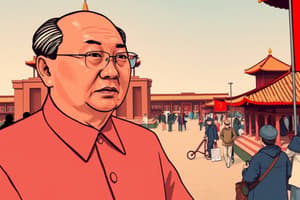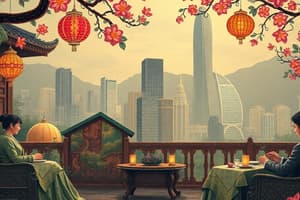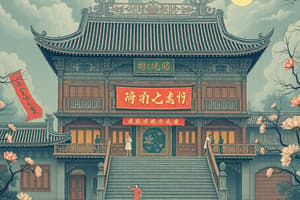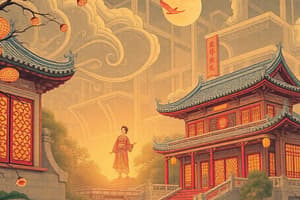Podcast
Questions and Answers
Which era left many Chinese resentful of 'foreign devils'?
Which era left many Chinese resentful of 'foreign devils'?
- Control by imperialistic nations in the 20th century
- Revolutionary upheavals in China
- The establishment of new political communities
- Imperialistic control during the 19th century (correct)
Who led the Revolution of 1911 in China?
Who led the Revolution of 1911 in China?
- Chiang Kai-shek
- Deng Xiaoping
- Mao Zedong
- Sun Yat-sen (correct)
What was a major theme dominating the revolutionary era in China?
What was a major theme dominating the revolutionary era in China?
- Nationalism (correct)
- Authoritarianism
- Democracy
- Monarchy
Who founded the Nationalist Party (Guomindang) in China?
Who founded the Nationalist Party (Guomindang) in China?
What was a major challenge of the 20th century in China as mentioned in the text?
What was a major challenge of the 20th century in China as mentioned in the text?
Which major event occurred in China in 1949 as mentioned in the text?
Which major event occurred in China in 1949 as mentioned in the text?
What did traditional Chinese assumptions about foreigners include?
What did traditional Chinese assumptions about foreigners include?
How did the imperialist powers challenge China's traditional assumptions in the 19th century?
How did the imperialist powers challenge China's traditional assumptions in the 19th century?
Which new influence emerged in the 20th century that emphasized 'right thinking' and moralism in China?
Which new influence emerged in the 20th century that emphasized 'right thinking' and moralism in China?
What was a key feature of Deng Xiaoping Theory introduced in the late 20th century?
What was a key feature of Deng Xiaoping Theory introduced in the late 20th century?
How has China's political culture been shaped over time?
How has China's political culture been shaped over time?
In what way did Maoism contradict the hierarchical nature of the old regime?
In what way did Maoism contradict the hierarchical nature of the old regime?
Who was the most prominent leader of the conservative faction in China before his retirement in 2003?
Who was the most prominent leader of the conservative faction in China before his retirement in 2003?
Which faction in China supported major capitalist infusion into the economy and an open door trade policy?
Which faction in China supported major capitalist infusion into the economy and an open door trade policy?
Who was the former governor of the central bank and the Premier of the PRC until 2003, associated with the Reformers faction?
Who was the former governor of the central bank and the Premier of the PRC until 2003, associated with the Reformers faction?
What was the main concern of the conservative faction in China regarding the power of the party and central government?
What was the main concern of the conservative faction in China regarding the power of the party and central government?
Which leader of the conservative faction left a leadership gap in 2003 upon his retirement?
Which leader of the conservative faction left a leadership gap in 2003 upon his retirement?
What major international trade organization did the reformers in China push for membership into, according to the text?
What major international trade organization did the reformers in China push for membership into, according to the text?
What type of government structure does the People's Republic of China have?
What type of government structure does the People's Republic of China have?
What is the main reason the branches of the Chinese government are not independent?
What is the main reason the branches of the Chinese government are not independent?
Which organization in China theoretically serves as the people's legislature?
Which organization in China theoretically serves as the people's legislature?
Who chooses the president and vice president of China according to the text?
Who chooses the president and vice president of China according to the text?
What is a key feature of government positions in China based on the information provided?
What is a key feature of government positions in China based on the information provided?
What term is used to describe the hierarchical levels of people's congresses in China?
What term is used to describe the hierarchical levels of people's congresses in China?
What type of entities largely operate as capitalist enterprises in China?
What type of entities largely operate as capitalist enterprises in China?
Which sector in the Chinese economy has experienced the most significant growth since the 1980s?
Which sector in the Chinese economy has experienced the most significant growth since the 1980s?
What has happened to price controls in China since the 1980s?
What has happened to price controls in China since the 1980s?
What role have township and village enterprises (TVEs) played in slowing peasant migration to cities in China?
What role have township and village enterprises (TVEs) played in slowing peasant migration to cities in China?
Which entities are responsible for making their own decisions in the Chinese economy?
Which entities are responsible for making their own decisions in the Chinese economy?
What is the main characteristic of private industry regulation in China?
What is the main characteristic of private industry regulation in China?
Study Notes
Traditional Chinese Worldview
- China has historically viewed itself as superior to other civilizations, with a strong sense of cultural and moral superiority.
- This worldview has often led to an assumption that other countries have little to offer China.
Communist Ideologies
- Maoism emphasized the importance of "right thinking" and moralism, while also promoting egalitarianism.
- Deng Xiaoping Theory, introduced in the late 20th century, balanced authoritarian political control with economic privatization.
Political Culture
- China's political culture is shaped by its geographical features and historical eras, including dynastic rule, imperialist control, and communist rule.
- The country's stability has been disrupted by foreign influence and revolutionary upheavals.
Imperialist Influence
- During the 19th century, China was weakened and divided into "spheres of influence" by imperialist nations such as England, Germany, France, and Japan.
- This era of foreign control sparked resentment and rebellion among the Chinese.
Revolutionary Era
- The 1911 Revolution, led by Sun Yat-sen, successfully re-established China as an independent country.
- The Communist Party, founded by Mao Zedong, emerged as a major force in Chinese politics.
- Three key themes dominated this era: nationalism, establishing a new political community, and socioeconomic development.
Factions within the Communist Party
- Three main factions exist within the Communist Party:
- Conservatives, who worry about erosion of party power and are suspicious of democratic reforms.
- Reformers/Open Door, who push for economic growth and development through capitalist infusion.
- No dominant leader has emerged since Jiang Zemin and Zhu Rongji retired in 2003.
Government Structure
- The government of the People's Republic of China has three branches, but they are not independent and are controlled by the Communist Party.
- The People's National Congress, provincial, city, and local congresses make up the legislative branch, but are subject to party authority.
Economic Development
- The economic reforms of the 1980s lifted price controls, allowing private businesses to grow and become more profitable than state-owned enterprises.
- The growth of rural factories and businesses has become the backbone of economic strength in the countryside.
Studying That Suits You
Use AI to generate personalized quizzes and flashcards to suit your learning preferences.
Description
Test your knowledge on Deng Xiaoping's leadership in China during the 1980s, including factional strife within the leadership and the Tiananmen Square incident. Learn about the different factions and their concerns regarding economic reform and government power.




